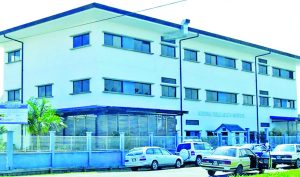…testing critical in fight against disease – WHO
The additional testing kits that are necessary to ascertain cases of coronavirus (COVID-19) are yet to arrive in Guyana. This is according to Deputy Chief Medical Officer (DCMO) Dr Karen Boyle who when asked for an update on the status of the testing kits said that Government is optimistic that these important kits will be in the country in the near future. The kits were supposed to have arrived last week.
“The kits haven’t arrived as yet,” she said in response. “They were supposed to arrive by the end of last week. So, I’m hoping [they arrive] before the end of this week.”

While Guyana has had five confirmed cases of the coronavirus, it had previously been reported by this publication that the authorities were monitoring a number of persons for signs of the disease after they would have arrived from high-risk countries. One person has since died and four of her family members have been quarantined.
When asked by this publication, however, Dr Boyle could not say how many people the Public Health Ministry currently have under surveillance but rather said that the number of people under surveillance is “constantly updated.”
Boyle was previously quoted in sections of the press announcing that the country only had 20 available testing kits. It had also been reported a few weeks ago that more testing kits were on the way to boost the Government’s capacity to fight the virus.
All testing for COVID-19 is done at the National Public Health Reference Laboratory in the Georgetown Public Hospital Corporation (GPHC) compound.
Testing critical
The World Health Organization said only two days ago that testing people with symptoms of the coronavirus lies at the heart of fighting the pandemic.
Al Jazeera in a report noted that while this is so the world is fast running out of testing kits and laboratories do not have enough supplies or the capacity to detect suspected cases. Experts say the result could be catastrophic.
The International Monetary Fund (IMF) in an assessment ranked Guyana among the few countries in the region least prepared to deal with the effects of the coronavirus epidemic, particularly the negative effects it will have on the economy and tourism.
In the assessment, the IMF rated countries in the Americas from red (least prepared) to green (most prepared). Countries like the United States and Canada were in the green zone. However, Guyana, Guatemala, Belize and Honduras are listed as red.
Some measures have been taken locally to slow the spread of the virus. These measures include closing schools and the Bank of Guyana interceding with local banks to make conditions favourable to allow customers to stay home and practice social distancing without a financial blowback.
A less popular measure taken by caretaker President David Granger was the Public Health Ordinance, which gave the Public Health Minister and other officials, draconian powers to confront the pandemic, including the right to destroy property of those infected by the virus. The Ordinance signed by Granger has no direct measures listed to combat the deadly disease since it was just “copied and pasted” from a 1945 health ordinance by the coalition Government without being revised. This view was expressed by former People’s Progressive Party/Civic (PPP/C) Member of Parliament, Dr Vindhya Persaud during an interview with Guyana Times where she explained that no changes were made to the ordinance, which, according to her, becomes evident when both the 1945 and present-day edicts are examined and no direct measure for COVID-19 is found listed but rather those for other infectious diseases.
According to the World Health Organisation, coronaviruses (CoV) are a large family of viruses that cause illnesses ranging from the common cold to more severe diseases such as Middle East Respiratory Syndrome (MERS-CoV) and Severe Acute Respiratory Syndrome (SARS-CoV).
Local health authorities have advised that if anyone is experiencing symptoms of coronavirus, they should contact the hotline on 231-1166, 624-3067, 624-2819 or 624-6674 and a team would be sent to their location.
Discover more from Guyana Times
Subscribe to get the latest posts sent to your email.











